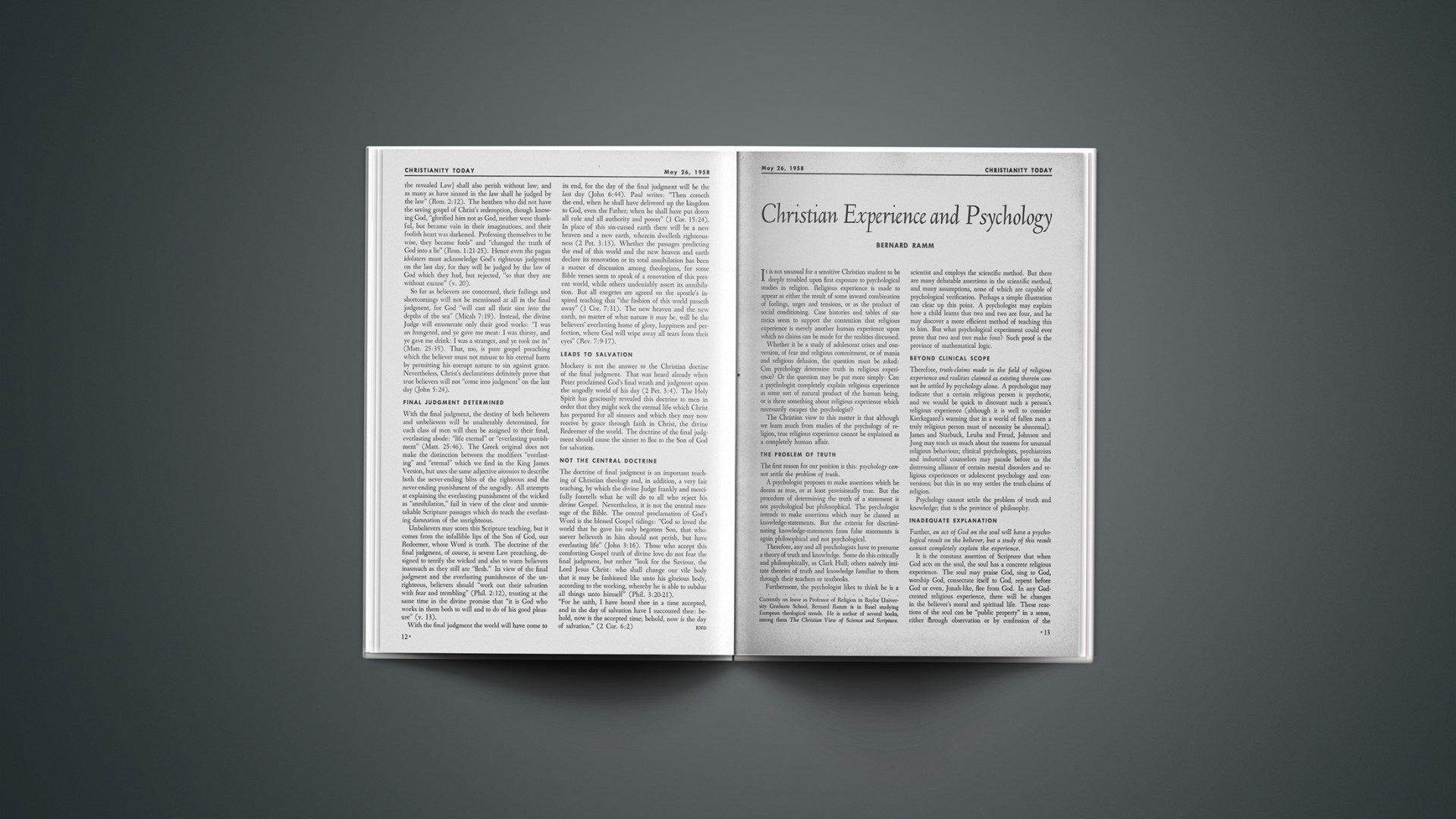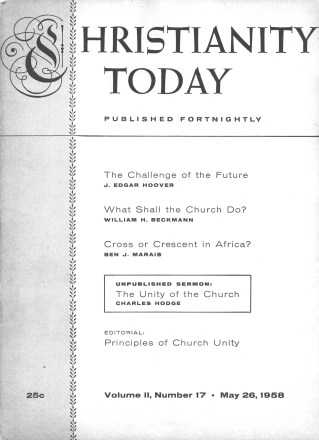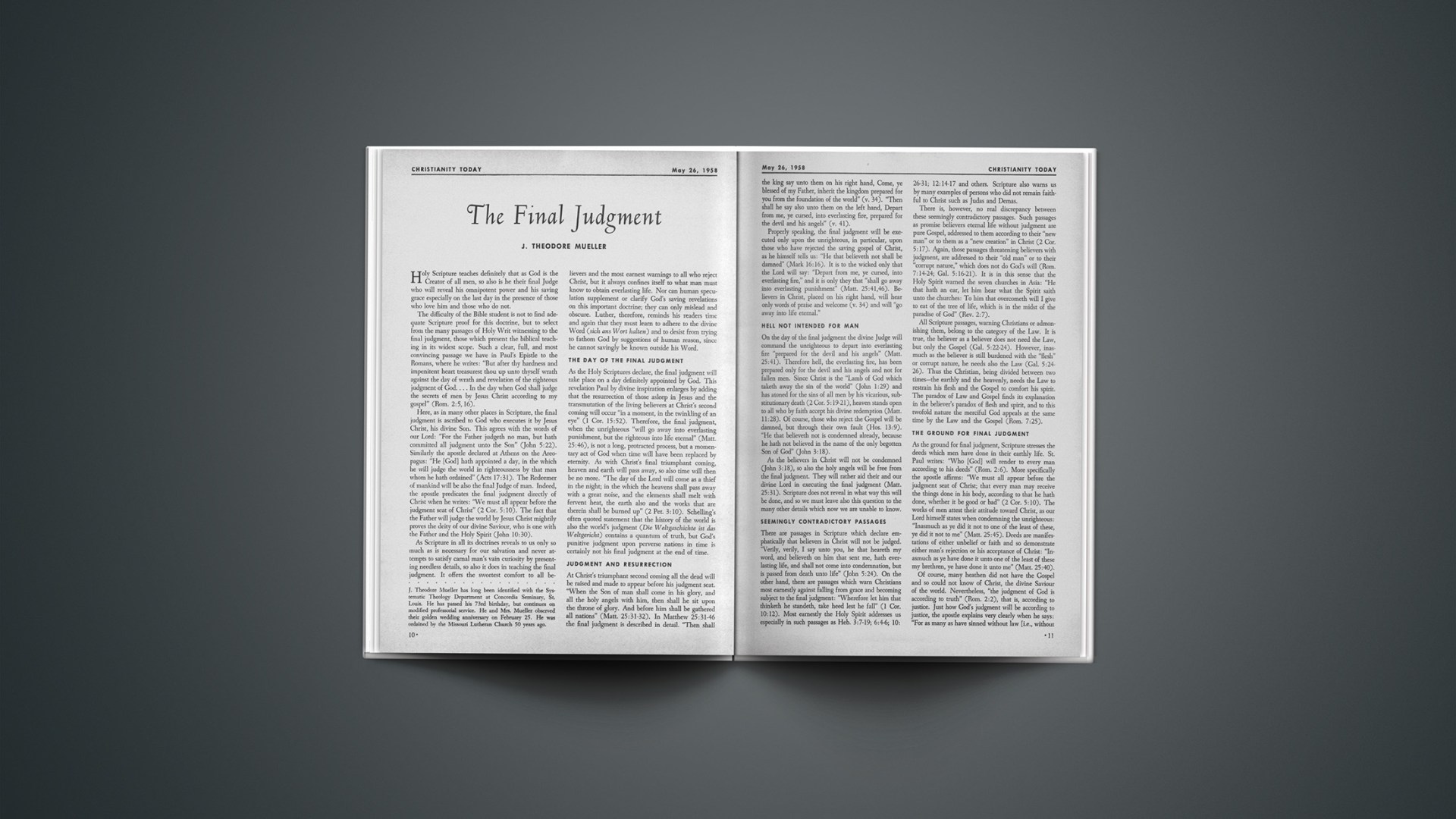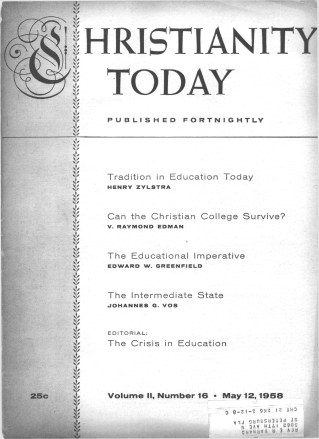It is not unusual for a sensitive Christian student to be deeply troubled upon first exposure to psychological studies in religion. Religious experience is made to appear as either the result of some inward combination of feelings, urges and tensions, or as the product of social conditioning. Case histories and tables of statistics seem to support the contention that religious experience is merely another human experience upon which no claims can be made for the realities discussed.
Whether it be a study of adolescent crises and conversion, of fear and religious commitment, or of mania and religious delusion, the question must be asked: Can psychology determine truth in religious experience? Or the question may be put more simply: Can a psychologist completely explain religious experience as some sort of natural product of the human being, or is there something about religious experience which necessarily escapes the psychologist?
The Christian view to this matter is that although we learn much from studies of the psychology of religion, true religious experience cannot be explained as a completely human affair.
The Problem Of Truth
The first reason for our position is this: psychology cannot settle the problem of truth.
A psychologist proposes to make assertions which he deems as true, or at least provisionally true. But the procedure of determining the truth of a statement is not psychological but philosophical. The psychologist intends to make assertions which may be classed as knowledge-statements. But the criteria for discriminating knowledge-statements from false statements is again philosophical and not psychological.
Therefore, any and all psychologists have to presume a theory of truth and knowledge. Some do this critically and philosophically, as Clark Hull; others naively imitate theories of truth and knowledge familiar to them through their teachers or textbooks.
Furthermore, the psychologist likes to think he is a scientist and employs the scientific method. But there are many debatable assertions in the scientific method, and many assumptions, none of which are capable of psychological verification. Perhaps a simple illustration can clear up this point. A psychologist may explain how a child learns that two and two are four, and he may discover a more efficient method of teaching this to him. But what psychological experiment could ever prove that two and two make four? Such proof is the province of mathematical logic.
Beyond Clinical Scope
Therefore, truth-claims made in the field of religious experience and realities claimed as existing therein cannot be settled by psychology alone. A psychologist may indicate that a certain religious person is psychotic, and we would be quick to discount such a person’s religious experience (although it is well to consider Kierkegaard’s warning that in a world of fallen men a truly religious person must of necessity be abnormal). James and Starbuck, Leuba and Freud, Johnson and Jung may teach us much about the reasons for unusual religious behaviour; clinical psychologists, psychiatrists and industrial counselors may parade before us the distressing alliance of certain mental disorders and religious experiences or adolescent psychology and conversions; but this in no way settles the truth-claims of religion.
Psychology cannot settle the problem of truth and knowledge; that is the province of philosophy.
Inadequate Explanation
Further, an act of God on the soul will have a psychological result on the believer, but a study of this result cannot completely explain the experience.
It is the constant assertion of Scripture that when God acts on the soul, the soul has a concrete religious experience. The soul may praise God, sing to God, worship God, consecrate itself to God, repent before God or even, Jonah-like, flee from God. In any God-created religious experience, there will be changes in the believer’s moral and spiritual life. These reactions of the soul can be “public property” in a sense, either through observation or by confession of the believer. And as such, they may become matters of psychological study.
The religious person may be studied physiologically, psychologically and sociologically. Such a study may in some instances create valid suspicion over the integrity of his religious experience (e.g., in cases where a person who claims divine healing has his old ailment return in force). But if someone’s experience is the result of the action of the Holy Spirit, then a physiological-psychological-sociological study cannot give us all the facts. For the most important fact of all, the Holy Spirit himself, is not within grasp of the psychologist. The issue still remains, an act of God cannot be settled on psychological grounds. As Bavinck has correctly said, “History and psychology can only exhibit religious phenomena. They cannot evaluate them” (The Doctrine of God, p. 76, italics his).
Not Subject To Test
Again, no psychological tests can be made of religious truth. Scripture informs us that it is sin to tempt God. A controlled experiment to test spiritual truth is tempting God. As a Christian psychologist has well said, a psychiatric hospital could not be divided into two parts, half the patients being prayed for and the other half receiving mental treatment, and the authorities expecting at the end of their “experiment” to discover a correlation, or lack of it, between prayer results and mental healing. That would be tempting God. Neither could one twin be baptized and the other not for the purpose of serving as a “control group.”
The possibility of experimentation with spiritual truth is out of the question. “In no laboratory can we reproduce the situation in which a man is experiencing the impact of the Holy Spirit,” writes J. G. McKenzie. “We cannot stage either the conviction of sin or the forgiveness of sin” (Psychology, Psychotherapy, and Evangelicalism, p. 44).
Spiritual Order Unique
The spiritual order does not operate like the material order. A lack of proper evidence can doom a material hypothesis, but in the spiritual order apparent inactivity of God (as in the case of Habakkuk), or suffering (Job), or severe testing (Abraham), or even death itself (Jesus Christ) does not count against spiritual truth. God’s actions in developing a man’s spiritual character are often beyond our understanding.
One of the old chestnuts from logic books is the story of a hen. For one thousand days the farmer fed this hen faithfully. According to the law of uniformity, the chicken assumed the hypothesis that it would be fed thus another thousand days. But on day number 1001, the chicken’s head was lopped off. The chicken had confused the material order with the personal order, and in its confusion lost its head!
Enthusiastic Christians who would seek confirmation of Christianity out of the latest works on mental health ought to be restrained. Many eminent figures of the Bible were what they were because they were not conformed to patterns of mental hygiene! We must restrain the psychologist who would sin in tempting God through experimentation on spiritual truth.
The Limits Of Psychology
The actions of God on the human soul are through the Holy Spirit, and are therefore mysterious.
Our Lord taught Nicodemus (John 3) that the actions of the Holy Spirit were mysterious and real. The Spirit produces a real work in regeneration. As we know the wind blows, we know that the Spirit works. Just as the motions of the wind are invisible at night (for Nicodemus came by night), so the motions of the Holy Spirit are real though mysterious.
It is this mysteriousness that sets limits to the psychology of religion. A psychologist may study a man’s conversion, but not his regeneration; he may study the human spirit, but not the divine Spirit. To get all the data about one’s spiritual experiences, an investigator must include the actions of the Holy Spirit which is precisely what he cannot do.
God-Centered Approach
Finally, the biblical approach to religious experience is God-centered.
According to Scripture, true religious experience is the result of Holy Spirit action on the human soul. And the emphasis falls more on God who creates the experience than on man who has it. There are touching and moving spiritual experiences reflected in the Psalms, but even so the eye of the Psalmist is fixed intently upon God. The important matter in Scripture is not that man experiences, but that God acts. The critical question, then, is that of the reality of God, and not the peculiarity of experience.
Thus the emphasis in Scripture is upon the Spirit who creates experience. David’s great cry, “take not thy Holy Spirit from me” (Ps. 51:11) has nothing to do with our modern debates on the admissibility of salvation, but has everything to do with the Holy Spirit as creator of genuine spiritual experiences.
Two Healthy Emphases
A healthy theology will assert two things in regard to psychology:
First, that all efforts of psychologists to explain away religious experience must be resisted. Christianity is grounded in the self-revelation of God given to man, and does not hang on the slender thread of religious experience. Psychologists of religion, therefore, deal with secondary and tertiary matters, never directly with the divine Spirit.
Second, that anything which attempts to ground the Christian faith solely in religious experience, or any movement within Christendom which exalts personal religious experience over against the God who creates true spiritual experiences must be resisted.
How much ado is there in Scripture over this or that man’s conversion? Very little, with the exception of Paul’s conversion of which some was made, due to the peculiarly theological cruciality of its nature. But the New Testament gives little regard to the conversion experience of this famous or that notorious character because, from the perspective of biblical faith, the real wonder is that God comes to us, and through Jesus Christ creates a living fellowship in our hearts. And as this is true, it is just as much miracle in the heart of a child as in the heart of a murderer; it is just as much miracle in the heart of a common daily laborer as it is in the heart of some world-renowned personality.
A theology that knows its Scripture never overemphasizes psychological experience at the expense of the miracle-action of God. Rather, it is careful to rest its apologetic not in the flux and flow of religious experience, but in the self-revelation of the eternal God.
Currently on leave as Professor of Religion in Baylor University Graduate School, Bernard Ramm is in Basel studying European theological trends. He is author of several books, among them The Christian View of Science and Scripture.












